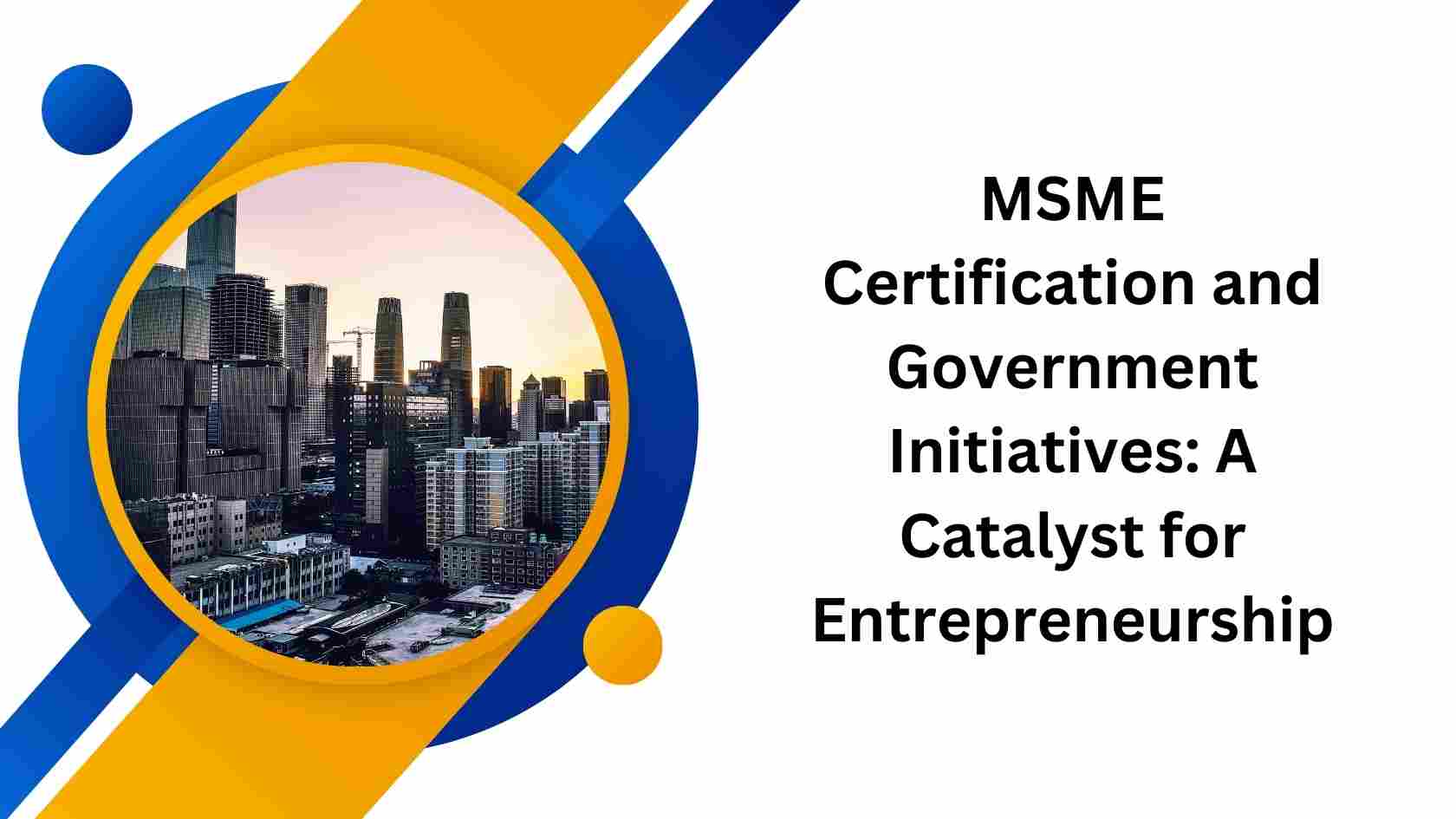MSME Certification and Government Initiatives: A Catalyst for Entrepreneurship

MSME certification is a formal acknowledgment by the government, affirming the status of an enterprise as a Micro, Small, or Medium Enterprise. The categorization is typically based on factors such as investment in plant and machinery, turnover, and employment. Obtaining an MSME Certificate brings several advantages to businesses, including priority sector lending, subsidies, and various tax exemptions. It serves as a testament to the enterprise’s contribution to the economy and enhances its credibility while engaging with customers, suppliers, and financial institutions.
Government Initiatives:
Governments worldwide have implemented a range of initiatives aimed at fostering the growth of MSMEs. These initiatives encompass financial support, skill development, technology adoption, and market access. The introduction of schemes like the Prime Minister’s Employment Generation Programme (PMEGP), Credit Linked Capital Subsidy Scheme (CLCSS), and various state-specific initiatives has provided a substantial boost to MSMEs.
Additionally, governments have prioritized digitalization and technological advancements to help MSMEs integrate into the global supply chain. Platforms like the Udyam Registration Portal in India streamline the MSME certification process, making it more accessible and efficient for entrepreneurs. These efforts not only reduce bureaucratic hurdles but also encourage more enterprises to formalize their operations.
Expanding Access to Finance:
One of the critical components of government initiatives supporting MSMEs is the focus on expanding access to finance. Financial institutions often hesitate to extend credit to small enterprises due to perceived risks. To address this, governments have introduced credit guarantee schemes, collateral-free loans, and interest rate subsidies. These measures not only inject much-needed capital into MSMEs but also empower entrepreneurs to take calculated risks, innovate, and expand their operations.
Skill Development Programs:
Governments recognize that a skilled workforce is crucial for the success of MSMEs. Many initiatives aim to enhance the skill set of entrepreneurs and their employees. Training programs cover a spectrum of areas, from technological proficiency to managerial skills. This not only boosts the quality of products and services offered by MSMEs but also increases their competitiveness in the market. By investing in the human capital of MSMEs, governments lay the foundation for sustainable growth and resilience.
Promoting Innovation and Technology Adoption:
In the rapidly evolving business landscape, the adoption of technology is indispensable for MSMEs to stay competitive. Government initiatives often include incentives for adopting new technologies, implementing efficient processes, and fostering innovation. Subsidies for technology upgrades, research and development grants, and access to technology parks contribute to the digital transformation of MSMEs. These efforts not only enhance productivity but also enable MSMEs to tap into new markets, both domestically and internationally.
Market Access and Export Promotion:
MSMEs often face challenges in accessing larger markets due to limited resources. Recognizing this, governments initiate programs to facilitate market access and promote exports. Specialized trade fairs, export promotion councils, and e-commerce platforms supported by the government provide MSMEs with opportunities to showcase their products to a broader audience. By integrating MSMEs into global value chains, these initiatives contribute to economic diversification and enhance the overall competitiveness of the nation.
Sustainable and Inclusive Growth:
Government initiatives for MSMEs increasingly focus on fostering sustainable and inclusive growth. This involves creating an ecosystem where businesses thrive without compromising environmental and social considerations. Incentives for eco-friendly practices, green certifications, and socially responsible business models are becoming integral components of government support. This not only aligns MSMEs with global sustainability goals but also enhances their reputation, attracting socially conscious consumers and investors.
Global Collaborations and Trade Agreements:
In an era of globalization, governments are increasingly recognizing the importance of facilitating international collaborations for MSMEs. Trade agreements and collaborations with other nations provide MSMEs access to new markets, technologies, and diverse consumer bases. Governments actively negotiate favorable terms for MSMEs in international trade agreements, reducing trade barriers and opening up avenues for cross-border business. This not only expands the market reach of MSMEs but also exposes them to best practices, fostering a culture of continuous improvement.
Digital Transformation and E-Governance:
The digital era has ushered in a new wave of opportunities for MSMEs, and governments are quick to leverage technology to support them. E-Governance initiatives streamline bureaucratic processes, making it easier for MSMEs to comply with regulations and access government services. Digital platforms and marketplaces, supported by the government, enable MSMEs to showcase their products and services globally. Embracing digital tools also enhances efficiency, reduces costs, and improves overall business operations for MSMEs.
Entrepreneurship Incubators and Accelerators:
Governments are increasingly establishing entrepreneurship incubators and accelerators to nurture and support budding MSMEs. These programs provide mentorship, access to funding, and shared resources to startups, helping them navigate the initial challenges of entrepreneurship. By fostering innovation and providing a supportive ecosystem, governments aim to catalyze the growth of MSMEs from their inception, ensuring a higher success rate and long-term sustainability.
Social and Financial Inclusion:
To ensure that the benefits of MSME certification growth are distributed equitably, governments strongly emphasize social and financial inclusion. Initiatives that focus on supporting women entrepreneurs, minority-owned businesses, and enterprises in rural areas are gaining prominence. Financial literacy programs, targeted funding schemes, and preferential policies aim to create a level playing field, enabling a more diverse array of entrepreneurs to participate in economic development.
Note: You can also Print Udyam Certificate
Adaptation to Crisis:
Recent global events have highlighted the need for MSMEs to be resilient in facing unforeseen challenges. Governments are responding by introducing initiatives that help MSMEs adapt to crises. This includes providing financial assistance during economic downturns, creating contingency plans, and offering training on crisis management. The goal is to ensure that MSMEs not only survive adversity but also emerge stronger and more resilient.
Conclusion:
In the ever-evolving landscape of entrepreneurship, MSME certification, and government initiatives continue to play a pivotal role in shaping the success of small and medium-sized enterprises. The multifaceted support provided by governments – ranging from financial assistance to digital transformation and global collaborations – reflects a commitment to creating an environment where MSMEs can thrive. As these initiatives evolve, the symbiotic relationship between governments and MSMEs holds the potential to drive sustained economic growth, foster innovation, and contribute to a more inclusive and resilient global economy. By recognizing and harnessing the power of MSMEs, governments can truly transform them into the engines of progress in the 21st century.




